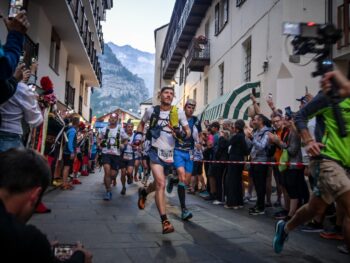During the 2023 TOR450 - Tor des Glaciers, CERISM (Inter-University Research Center Verona-Trento on mountain performance) monitored seven participants throughout the race for research purposes.
The study focused on aspects such as sleep management, coping strategies, changes in the autonomic nervous system due to stress, and the decline in cognitive abilities resulting from fatigue and sleep deprivation.
Several interesting results emerged: for instance, athletes in the Tor des Glaciers, selected for their experience, employ advanced and functional strategies to tackle daily challenges during the race. This contrasts with beginners in other circuit races who tend to experience emotional hyper-involvement with each problem.

An unexpected finding was the significant increase in all HRV indices—compared to baseline values—400 km into the race. Currently, no studies in the literature observe this phenomenon. Simply put, the opposite phenomenon would be expected: an increase in perceived stress levels as the race progresses, leading to a decrease in HRV indices. To further investigate this surprising phenomenon, researchers will be on the course again this year to conduct new tests. It's worth noting that the data was collected through daily interviews and measurements by four young researchers; three of whom graduated with a master's thesis in sports science last July on the research topics (the fourth is already a research fellow at CERISM). These four will be tirelessly present again this year on the course to interview, measure, and test some competitors. CERISM plans to publish the research on the Tor des Glaciers in 2025.
To further investigate this surprising phenomenon, researchers will be on the course again this year to conduct new tests. It's worth noting that the data was collected through daily interviews and measurements by four young researchers; three of whom graduated with a master's thesis in sports science last July on the research topics (the fourth is already a research fellow at CERISM). These four will be tirelessly present again this year on the course to interview, measure, and test some competitors. CERISM plans to publish the research on the Tor des Glaciers in 2025.

© 2009-2024 by VDA Trailers SSDrl
Any dissemination for commercial purposes of photographic or video images captured during the event, via any means (internet, social networks, TV, press, magazines, etc.), without written authorisation from the organisation is prohibited. GTC®, GTC100™, GTC55™, GTC30™, TORX®, TOR®, Tor des Géants®, Tor des Glaciers™, Passage au Malatrà™, Tot Dret™, TOR450™, TOR330™, TOR130™, TOR100™ and TOR30™ are trademarks owned or used exclusively by VDA Trailers. Any communication of the event or use of images of it must be done in observance of the name of the event and registered trademarks, subject to agreement by the organisation.
Valle d’Aosta Trailers SSDrl | Via Roma, 98 | 11013 Courmayeur | CF/P.IVA 01139360075 | Nr. Iscr. Reg. Imprese AOSTA AO-70629




